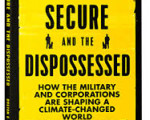How the Military and Corporations are Shaping a Climate-Changed World (Nick Buxton and Ben Hayes)
The Secure and the Dispossessed: How the Military and Corporations are Shaping a Climate-Changed World. Edited by Nick Buxton and Ben Hayes / November 2015
 This book seeks to find answers to difficult and uncomfortable questions such as: Who really benefits and loses when “action” is taken to tackle climate change? “Resilience” for whom? What if the world’s leaders have decide not to deal with climate change and instead deal with the impacts?
This book seeks to find answers to difficult and uncomfortable questions such as: Who really benefits and loses when “action” is taken to tackle climate change? “Resilience” for whom? What if the world’s leaders have decide not to deal with climate change and instead deal with the impacts?
The introduction explains there is an argument which is gaining support that justifies strengthening the military. This is that “climate change is a ‘threat multiplier’ that will make current global conflicts and social tensions far worse, leading to a far more insecure world”.
The book is clear that it is not about stopping climate change and instead fully recognises the reality that climate change is already happening.
The editors asked each of the authors to explore the “political and economic forces that make a militarised and corporatised future poosible”, whilst also including examples of resistance and inspiring alternatives. The book includes chapters on:
- The links between climate change and conflicts. How the causes and impacts of climate change will not be dealt with through neoliberalism and militarism.
- The militarisation of extraction (e.g. of oil in Nigeria).
- How multinationals are seeking to profit from the climate crisis by managing “risk” to supply chains and promoting “corporate resilience”.
- How government’s are using climate change as an excuse to introduce emergency powers (e.g. states of emergency) that undermine human rights. The security agenda is being used to monitor and undermine activist groups who call for structural change to deal with the ecological crisis. In some countries environmental defenders are murdered.
- The exclusion of ‘climate refugees’ by the ‘border industrial complex’.
- The military security industrial complex: “the military’s ‘green pivot’ shows that it is mainly driven by energy, not environmental concerns”.
- The dangers of geo-engineering.
- Greenwashing of the arms trade.
- The securitisation of availability of food, water and energy: using the language of climate security to justify resource grabs and repression (the politics of security and the politics of scarcity). Marginalised communities around the world are confronting these powerful interests to assert ‘sovereignty’ over these resources.
- The crucial role of trade unions in tackling climate change.
- Lessons for a just transition.
The conclusion makes several observations including:
For the security/military industrial complex, climate change is just the latest in a long line of threats constructed in such a way as to consolidate its grip on power and public finance. For corporations, the risk posed by climate change is also an opportunity for profit, nowhere more so in a security industry that offers an endless supply of resilience- and disaster-related services.
In true Orwellian fashion, much of the structural violence is done in the name of tackling climate change and creating greater security for everyone (e.g. land and water grabbing, repression and racism against migrants).
Sometimes the rhetoric of environmentalists on climate change contributes to the problem by talking about climate change as a threat…which can mean demanding action at all costs, can too easily play into the hands of a militaristic Pentagon planner or a self-serving corporate executive.
The book ends by rejecting the attempt to use fear to justify more securitisation which plays into the hands of the military and corporations. Instead “we can reject their forecasts and believe in the power of popular movements to advance a different vision of the future, one that harnesses humanity’s compassion, creativity and cooperation”. It notes there are many examples post-disaster of grassroots organisation and solidarity (e.g. Occupy Sandy).
More information
Website accompanying the book: climatesecurityagenda.org
Listen to a recording of the book launch in London in November 2015
————————————
This summary was prepared by Why Green Economy?. The views expressed have been paraphrased. See the original source for more information.

Leave a Reply